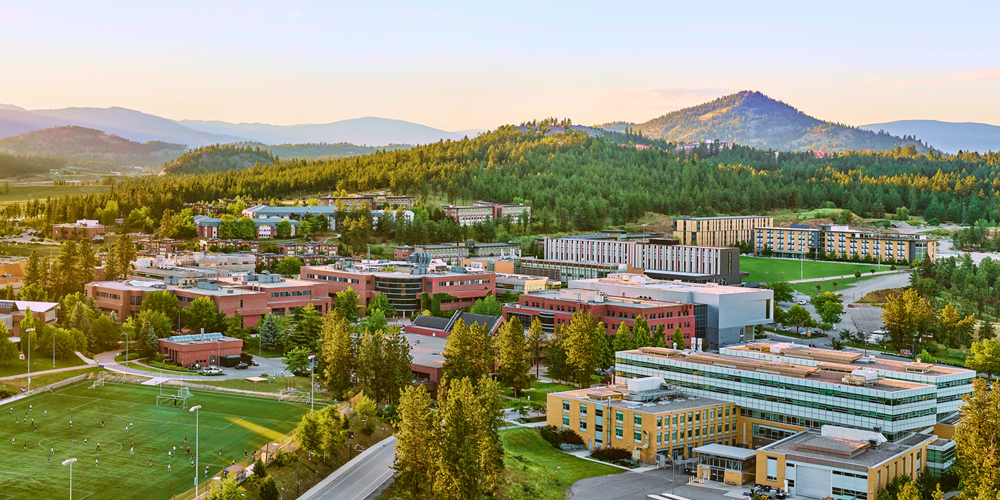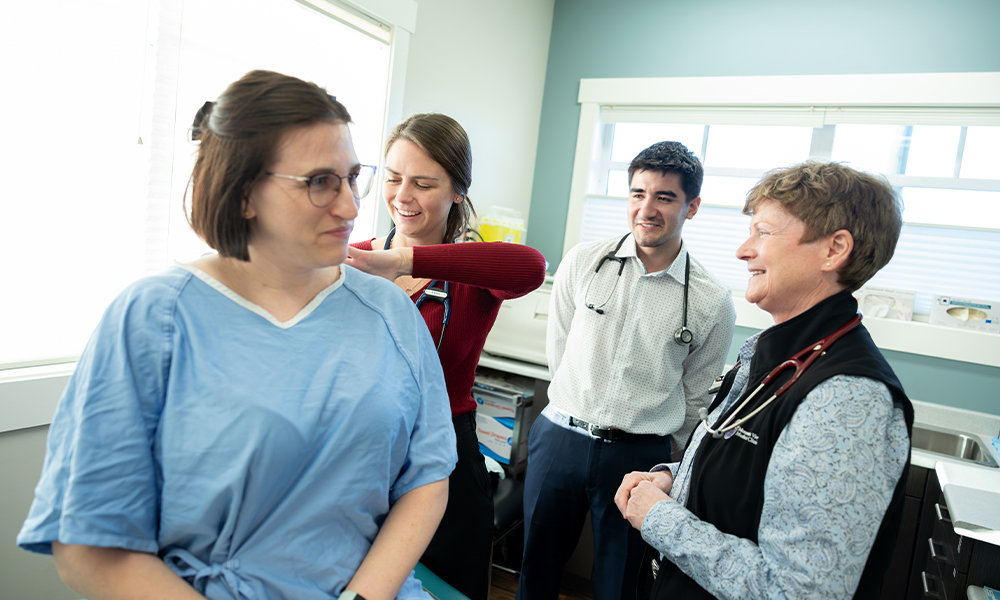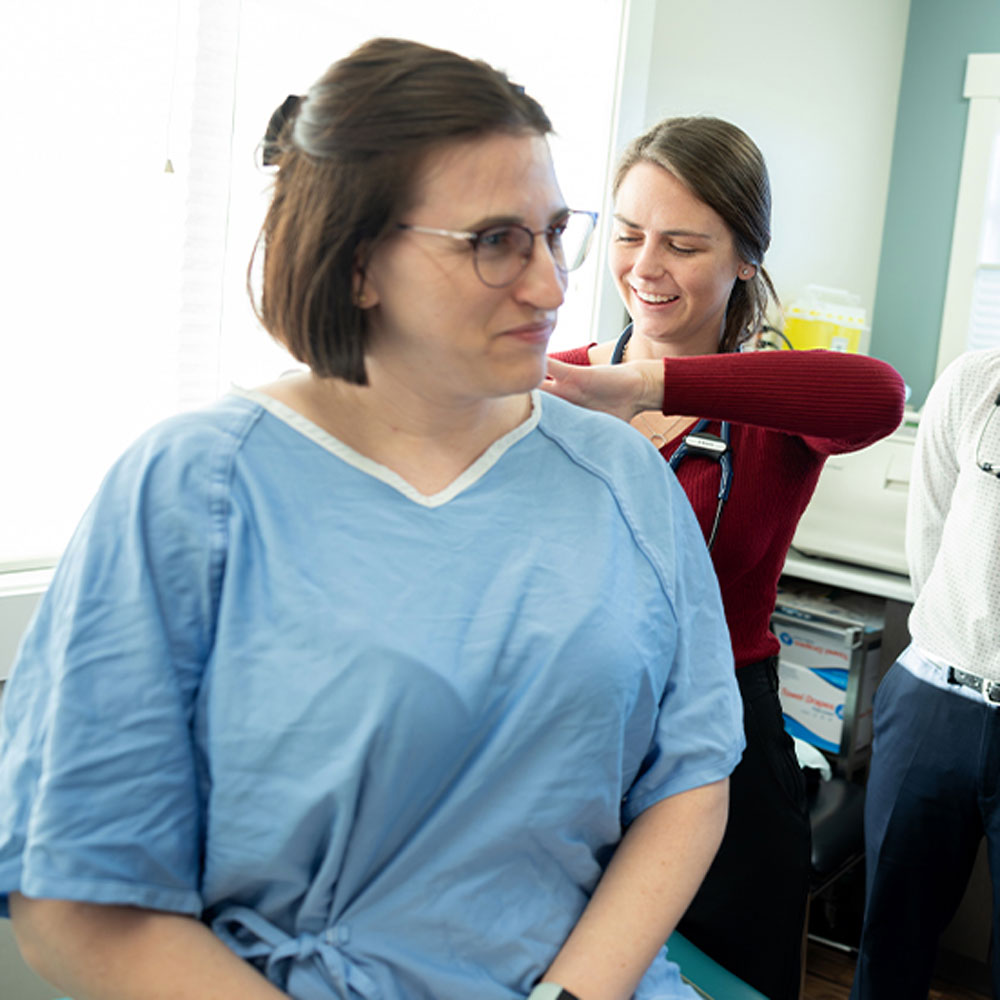MD Undergraduate Program
Doctor of Medicine (MD)

Degree
Doctor of Medicine
Length
4 years
Faculty/School
Faculty of Medicine Southern Medical Program
Why study medicine in the BC Interior?
The Southern Medical Program provides learners with outstanding clinical training experiences in 30 different communities throughout the Interior Health region.
Our students learn and train alongside an engaged community of more than 1,600 healthcare professionals. Our small class size provides students with the opportunity to foster close professional relationships with faculty, staff, and classmates.
Students also get to experience some of Canada’s most stunning landscapes and endless recreation opportunities.
Degree Overview
The MD Undergraduate Program is designed to educate and train students in communities across British Columbia where there is an urgent need for more physicians, particularly in rural, northern and island areas.
The Faculty of Medicine’s distributed education model provides 328 annual medical school seats based at four regional medical programs:
- 40 students in the Southern Medical Program (SMP); based at UBC’s Okanagan campus in Kelowna
- 40 students in the Island Medical Program (IMP); based at the University of Victoria on Vancouver Island
- 40 students in the Northern Medical Program (NMP); based at the University of Northern British Columbia in Prince George
- 208 students in the Vancouver Fraser Medical Program (VFMP); based at UBC Vancouver’s Point Grey campus
PATHWAYS
In addition to our general admissions process, the Faculty of Medicine offers several additional pathways for suitable applicants:
Learn more about the MD Admissions Pathways.
Complete the Rural and/or Northern Training section of the online application to be considered for the NMP, up to 14 positions with the SMP, up to 4 positions with the IMP, and up to 4 with the VFMP Fraser Cohort.
Self-identified Indigenous students can apply either to the general admission process or the Indigenous pathway. Supplementary documentation and an additional interview is required.
Students who self-identify as Black, or Black multiracial and identify with your Black ancestry can apply through this pathway. Assessment and evaluation of your pre-interview application will be conducted by the Black Student MD Admissions Subcommittee, which includes Black physicians, faculty members, medical students, members of the Black community, members of the MD Admissions subcommittee, and faculty from across our distributed program. To learn more, contact Stephanie Awotwi-Pratt, Black Initiatives Coordinator at stephanie.awotwi-pratt@ubc.ca.
MD/PhD Admissions: The combined MD/PhD program is a seven-year program offered jointly by the Faculty of Medicine and the Faculty of Graduate Studies. The program is designed to recruit and support students who want to pursue a career as clinician scientists.
Information Sessions
Learn about the admission requirements, application process, and how the UBC Faculty of Medicine is training the next generation of physicians for our province.
MD Admissions Information sessions held from 12:00 to 1:00 pm via Zoom:
June 26th, August 14th, September 18th, October 16th, November 20th.
To register, please contact Carri Folk, Student Affairs and Admissions Coordinator, Southern Medical Program, at carri.folk@ubc.ca.
For additional sessions, visit the MD Admissions Office information session calendar.
Curriculum
Years 1 and 2 of the MD undergraduate curriculum are heavily lecture-based combined with early clinical exposure. SMP students divide their time between the Reichwald Health Sciences Centre at UBC Okanagan, the Clinical Academic Campus at Kelowna General Hospital, and the family physician offices in the greater Kelowna and Vernon areas.
Year 3 provides students with core and elective clerkship experiences. Diverse fields of medical practice include clinical and academic learning opportunities in ambulatory, hospital-based and rural/remote settings.
SMP students are not guaranteed to participate in Year 3 clerkship in Kelowna. Students will participate in either a Traditional Clerkship rotation at Kelowna General Hospital or Royal Inland Hospital in Kamloops, or they may apply for an Integrated Community Clerkship (ICC) rotation based at Vernon Jubilee Hospital, Kootenay Boundary Regional Hospital in Trail, or one of four other ICC sites across the province.
With the phased expansion to 40 students admitted annually, the expected number of SMP students completing their Year 3 clerkship at each site will be as follows:
Traditional Clerkships: Kelowna 24 students; Kamloops, 16 students
Integrated Community Clerkships: 4 students. (Note: ICC positions are open to all Year 3 UBC students to pursue, regardless of program site.)
See Education Sites for more information.
Year 4 continues with elective clerkship experiences and preparation for postgraduate residency training. Students complete electives across BC and Canada while returning to Kelowna for some coursework and exams. Near the end of Year 4, students participate in the CaRMS (Canadian Resident Matching Service) matching process placing them with their postgraduate residency training program.
Upon earning your medical degree, you will graduate to postgraduate residency training for the next two to seven years (depending on specialty) to become a fully-licensed physician.
Transportation
It is highly recommended that students own or have access to a personal vehicle. Training sites in the SMP are distributed throughout the Interior region, and travel between sites will be required.
In years 1 and 2, students will travel from the Reichwald Health Sciences Centre at UBC Okanagan to the Clinical Academic Campus at Kelowna General Hospital, as well as family practice offices throughout the greater Kelowna and Vernon areas.
Careers and outcomes
With clinical training widely distributed throughout British Columbia, we offer a unique approach to postgraduate medical education and support our learners to pursue lifelong learning opportunities and build lasting community connections.
UBC offers Family Medicine, together with 70 specialty and sub-specialty training programs recognized by the Royal College of Physicians and Surgeons of Canada and the College of Family Physicians of Canada. The duration of training varies from two years for Family Medicine to four to seven years for other specialties and sub-specialties.
Learn more about the MD curriculum and UBC postgraduate residency training.
UBC degrees are respected by employers around the globe. Program graduates will have the skills to pursue a career in a variety of fields like,
- Anesthesiology
- Cardiac Surgery
- Dermatology
- Diagnostic Radiology
- Emergency Medicine
- Family Medicine
- Family Medicine – Emergency Medicine
- Family Medicine – Clinician Scholar Program
- General Surgery
- Internal Medicine
- Laboratory Medicine – Anatomical Pathology
- Laboratory Medicine – General Pathology
- Laboratory Medicine – Hematological Pathology
- Laboratory Medicine – Medical Biochemistry
- Laboratory Medicine – Medical Microbiology
- Laboratory Medicine – Neuropathology
- Medical Genetics
- Neurology – Adult
- Neurology – Pediatrics
- Neurosurgery
- Nuclear Medicine
- Obstetrics & Gynecology
- Ophthalmology
- Orthopedic Surgery
- Otolaryngology – Head & Neck Surgery
- Pediatrics
- Physical Medicine & Rehabilitation
- Plastic Surgery
- Psychiatry
- Public Health and Preventive Medicine
- Radiation Oncology
- Urology
- Vascular Surgery
- Adolescent Medicine
- Cardiology – Adult
- Cardiology – Pediatric
- Child & Adolescent Psychiatry
- Clinical Immunology and Allergy – Adult
- Clinical Immunology and Allergy – Pediatric
- Colorectal Surgery
- Critical Care Medicine – Adult
- Critical Care Medicine – Pediatric
- Developmental Pediatrics
- Emergency Medicine – Pediatric
- Endocrinology & Metabolism – Adult
- Endocrinology & Metabolism – Pediatric
- Forensic Psychiatry
- Gastroenterology – Adult
- Gastroenterology – Pediatrics
- General Internal Medicine
- Geriatric Medicine
- Geriatric Psychiatry
- Gynecologic Oncology
- Gynecological Reproductive Endocrinology & Infertility
- Hematology – Adult
- Hematology/Oncology – Pediatric
- Infectious Diseases – Adult
- Infectious Diseases – Pediatric
- Maternal Fetal Medicine
- Medical Oncology
- Neonatal-Perinatal Medicine
- Nephrology – Adult
- Nephrology – Pediatric
- Pain Medicine
- Pediatric Surgery
- Respirology – Adult
- Respiratory – Pediatric
- Rheumatology – Adult
- Rheumatology – Pediatric
- Thoracic Surgery
ADMISSION, FEES, APPLYING
You could soon be studying at one of the world’s top universities. Be sure to review the content below to prepare for attending UBC Okanagan.
Applicants must apply centrally through the MD Admission Office. The entire admissions process—including initial screening, interviews, final selection and offers—takes approximately nine months. Review timelines for the next application cycle.
EXPERIENTIAL LEARNING
Students can engage is a wide variety of research and scholarly projects throughout their medical education and training. There are numerous opportunities to participate through the FLEX (Flexible and Enhance Learning) course as well as research experiences outside of the medical curriculum.
- Summer Student Research Projects (SSRP): First- and second-year students are eligible to apply for research funding from the Faculty of Medicine or Southern Medical Program to support their participation in eight weeks of supervised research occurring between June 1 and August 31.
- Studentships with the BCCA-SAHCSI or British Columbia Cancer Agency, Sindi Ahluwalia Hawkins Centre for the Central Southern Interior: Students are eligible to apply for studentship awards to support their involvement in cancer research. Students generally participate in these cancer research projects in the months of May through August.
- The Colin & Lois Pritchard Foundation Studentships at the BCCA-SAHCSI: Thanks to the Colin & Lois Pritchard Foundation, students can apply for an award to support their participation in cancer research in the Central Southern Interior of BC.

DISCOVER THE OKANAGAN
A diverse natural region with sandy beaches, beautiful farms, vineyards, orchards and snow-capped mountains, the Okanagan is an inspirational landscape perfect for those seeking leisure or outdoor adventure.
UBC’s Okanagan campus borders the dynamic city of Kelowna, a hub of economic development with a population of more than 150,000 people— the fourth fastest-growing population in Canada.

